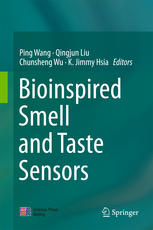

Most ebook files are in PDF format, so you can easily read them using various software such as Foxit Reader or directly on the Google Chrome browser.
Some ebook files are released by publishers in other formats such as .awz, .mobi, .epub, .fb2, etc. You may need to install specific software to read these formats on mobile/PC, such as Calibre.
Please read the tutorial at this link: https://ebookbell.com/faq
We offer FREE conversion to the popular formats you request; however, this may take some time. Therefore, right after payment, please email us, and we will try to provide the service as quickly as possible.
For some exceptional file formats or broken links (if any), please refrain from opening any disputes. Instead, email us first, and we will try to assist within a maximum of 6 hours.
EbookBell Team

4.1
20 reviewsThis book discusses the field of bioinspired smell and taste sensors which includes many new areas: sensitive materials, physiological modelling and simulation, and more. Similar to biological chemical sensing systems, bioinspired smell and taste sensors are characterized with fast responsive, high specificity and sensitivity. One of the most important parts of the field is that of sensitive elements originated from biological components, which enable the detection of chemical signals by mimicking the biological mechanisms. This book detailed describes processing, devices, recognition principles of sensitive materials, and concrete realizations. It is written for researchers, engineers and biologists who engages in interdisciplinary research and applications.
Dr. Ping Wang is a professor at Zhejiang University, Hangzhou, China. Dr. Qingjun Liu is a professor at Zhejiang University, Hangzhou, China. Dr. Chunsheng Wu is an associated professor at Zhejiang University, Hangzhou, China. Dr. K. Jimmy Hsia is a professor at University of Illinois at Urbana-Champaign, Urbana, USA.